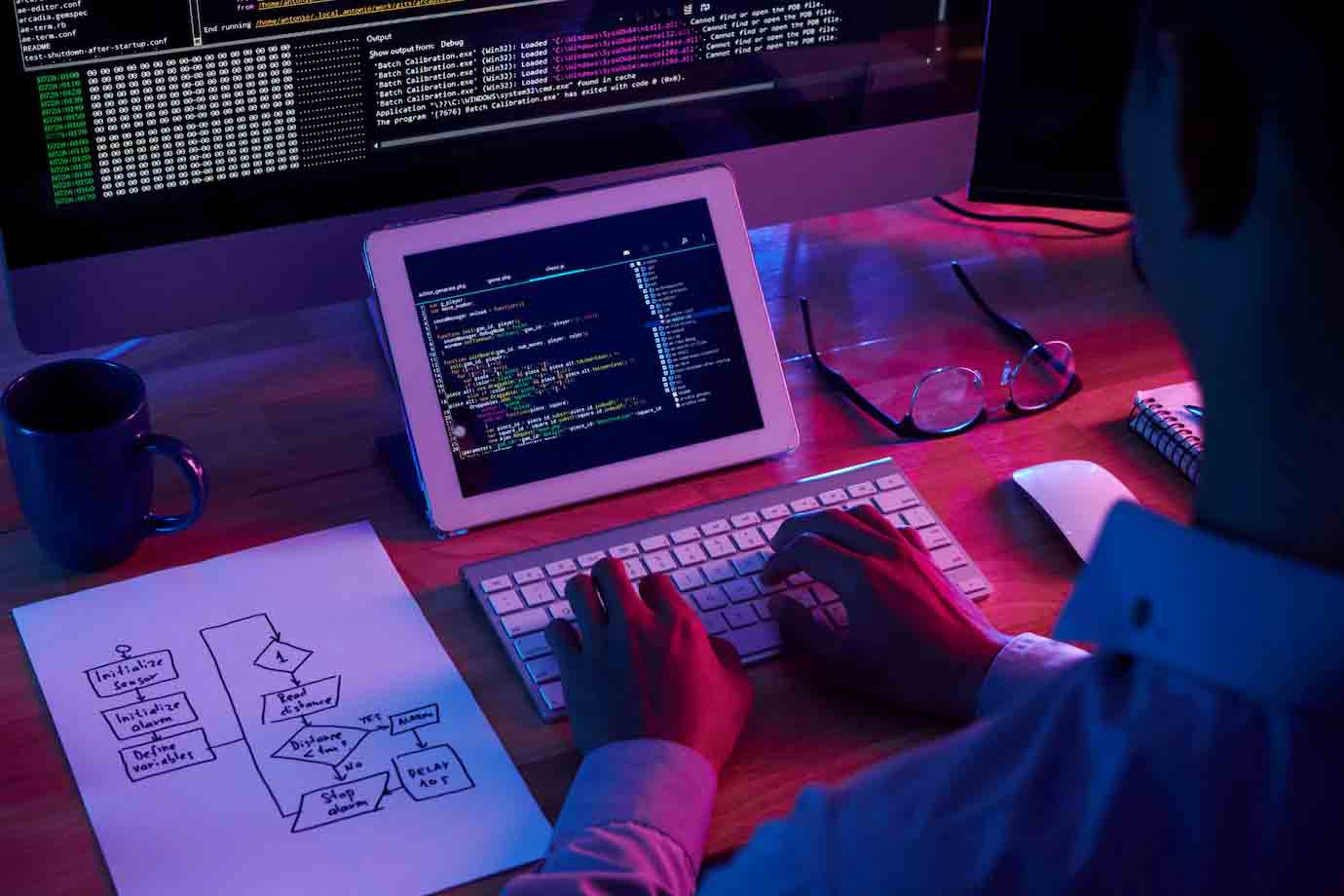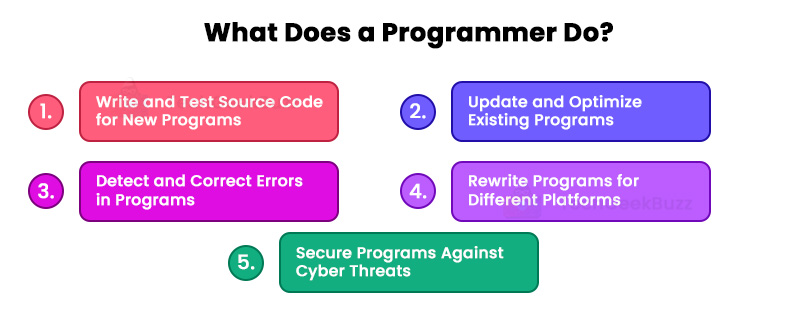We have surrounded ourselves with electronic devices and gadgets in this digital age. Whether it is using a coffee machine to prepare a coffee, finding a job, or ordering food to doorsteps, we use a wide variety of devices and software applications to accomplish various daily activities without any hassle. Not only daily activities but also businesses heavily rely on software programs to carry out their operations.
More intriguingly, self-driving cars, robots, digital assistants, and many other technological breakthroughs are making human lives more convenient. But have you ever wondered how these digital devices or software applications work? How do they fulfill the intended task?
Well, the mastermind behind all software applications and devices running smoothly as expected is the programmers. They are the ones who create software applications or various appliances by writing source code.
The most common definition of a programmer is a person who writes a computer program . However, there is a lot more for a programmer to do in addition to just writing the source code or computer programs.
In this blog post, we shall make you familiar with what a programmer is and what they do. Also, we shall briefly introduce you to the path of becoming a programmer and the salary insights of a programmer.
What is a Programmer?

A programmer is a professional who is in charge of creating software applications, web applications, websites, and computer programs that various devices follow to carry out the intended purpose. They leverage various programming languages to write source code, which is a series of instructions that computer systems need to follow to accomplish a specific task.
Not only do programmers write source code, but also they test, debug, update, and maintain source code. In other words, programmers are responsible for debugging, troubleshooting, and maintaining software systems and applications to ensure that they run seamlessly.
Most often, programmers and coders are the terms used interchangeably. Though both write source code to create software programs, their roles have major differences.
Coders are only responsible for writing source code. Meanwhile, programmers have to carry out detailed planning and design of the overall software program in addition to creating the source code. Along with writing code, they carry out other development activities, like designing, planning, testing, debugging, and maintaining source code. In a nutshell, we can say that coding is a subset of programming.
As a programmer, you can work independently or as a part of the software development team, along with coders, engineers, analysts, and testers. In addition, you can either choose to become an application programmer or system software programmer as per your preference and interest.
Along with programming languages, including C++, Java, Python, JavaScript, HTML/CSS, SQL, Ruby, Perl, and Swift, you should possess profound knowledge of the software development life cycle . This is because, in addition to writing and testing new code and optimizing existing code, you will also need to perform quality assurance testing, detect vulnerabilities and defects, and fix them as soon as possible.
What Does a Programmer Do?

Now, you might have got a little idea about what programmers do. Let us now discuss in detail what a programmer does or what are the roles and responsibilities of a programmer.
1. Write and Test Source Code for New Programs
Computer programmers are in charge of working closely with web developers and software developers to develop code for new software applications or web applications. Many times, they may have duties analogous to designers, i.e., creating the structure, look and feel, and functionality of websites or software applications.
Furthermore, computer programmers come up with effective ideas or solutions to solve specific business problems. So, they require strong analytical thinking and problem-solving skills.
2. Update and Optimize Existing Programs
Another responsibility for programmers is to update and improve existing programs. This suggests that they are in charge of writing and putting in place upgrades for already existing software. Updates may be made for a variety of reasons, such as bug corrections, feature enhancements, or the addition of new functionality, all with the main goal of improving the user experience.
Furthermore, the length of time it takes to update a particular software program might vary depending on its complexity, from a few days to months.
3. Detect and Correct Errors in Programs
The everyday responsibility of programmers includes testing software applications and websites that are not working properly with the intent to detect bugs and fix them. They carry out quality assurance testing on various parts of software applications that do not operate correctly, identify flaws, and fix them immediately.
4. Rewrite Programs for Different Platforms
Many times, programmers have to rewrite the source code of a particular software program in different programming languages to make it compatible with different operating systems. For instance, a software application requires two different source codes to run on Windows and macOS platforms.
5. Secure Programs Against Cyber Threats
Programmers are also involved in the cybersecurity domain, where they identify spots that are susceptible to malicious attacks in software applications and work on them to fix them. Doing this prevents software programs from being hacked by threat actors. In addition, programmers are capable of writing source code that can prevent potential security breaches and data losses.
How Much Does a Programmer Earn?
Programmers or computer programmers are one of the highest-paying IT jobs across the globe. However, it is important to remember that not every programmer gets the same pay scale. Instead, the pay scale varies depending on certain factors, such as skills, experience level, location, and the employer itself.
However, the estimated average salary of an entry-level computer programmer in India is INR 3.6 lakhs per annum. An average base salary for a programmer with 1 to 4 years of expertise is INR 5 lakhs annually. On the other hand, a mid-level computer programmer with 5 to 9 years of experience receives an average salary of INR 9 lakhs per annum. An experienced programmer with more than nine years of experience makes between INR 13 and 15 lakhs annually.
Conclusion
This was all about a programmer. One who is responsible for writing, updating, testing, debugging, and maintaining software applications or computer programs is a programmer. The role of a programmer is not limited to just writing the source code. Instead, it is involved in the entire life cycle of software development.
A career as a programmer is beneficial in terms of both financial gain and personal development. So, if you are planning to become a programmer, we have mentioned in this article the traditional path that you can follow.
People are also reading:





Leave a Comment on this Post